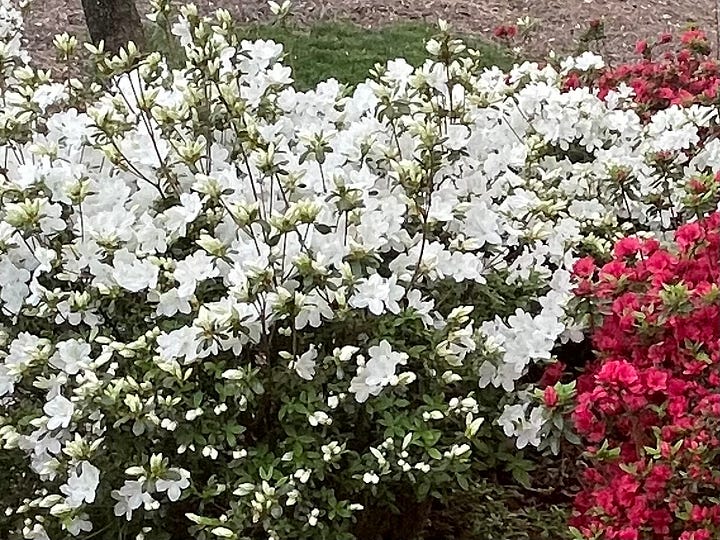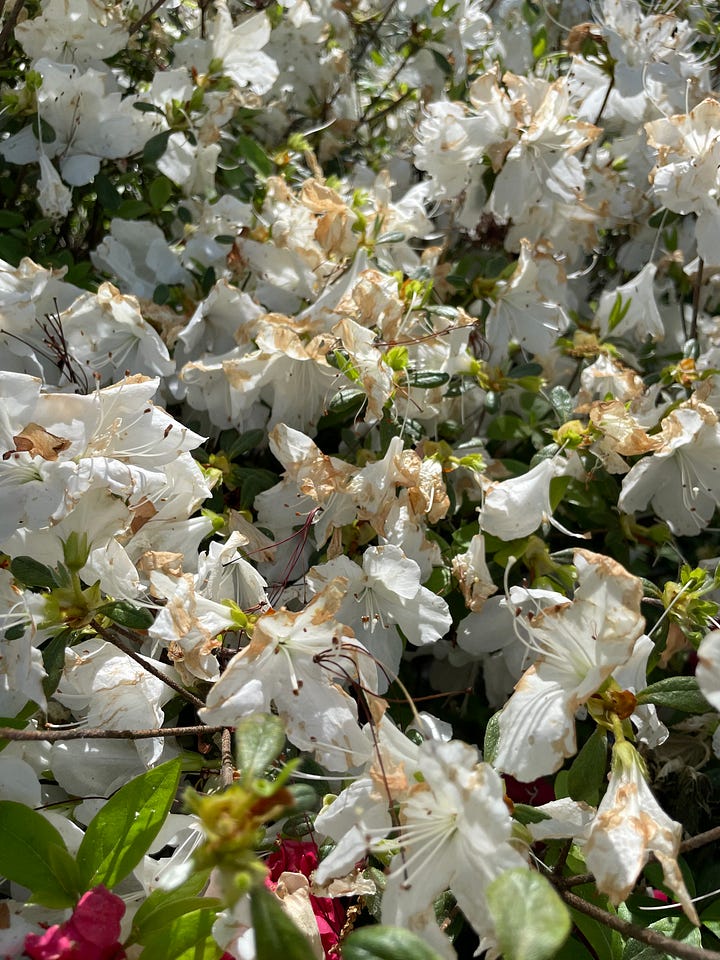

A few weeks ago, I wrote the poem “Flowers When They Come, and Flowers When They Go” as a way to process the sense of sadness, even dread, I feel whenever flowers fade. Of course, that sadness wasn’t just about the fading of flowers. It was about the melancholy that washes over me when anything I happen to like, love, or care about—a relationship, a church, a way of life, my health, a career, organizational or legal policies, a cause, etc.—goes away or changes in ways that are difficult to accept. The poem ended with a prayer for grace to delight in good things while they’re present but also to release them when they go away.
My family went to church this morning. We celebrated Jesus’ resurrection and its cosmic implications alongside a few hundred others. It dawned on me that it was the first Easter Sunday in four years that we had been at church. It was good to be there. In fact, I’m grateful to be back in a season of being there every Sunday and connected to the rhythms of corporate worship, confession, prayer, Scripture reading, and communion. It’s been restorative.
As we arrived back home and pulled into our driveway, I noticed that quite a few of our azaleas were at the tail end of their bloom. It was especially apparent on the white azalea bushes. It’s amazing how quickly things that were bright and dazzlingly beautiful for weeks suddenly become unsightly when they fade. So, after we ate lunch, I decided to do some deadheading. I put on my work clothes, went outside, and started pulling off faded flowers.
There are several reasons to deadhead. The most obvious one is that it improves aesthetics and keeps the garden looking tidy. But deadheading also helps the plant redirect energy toward new growth that can ensure a healthy blooming season next year.
Next year!
I suppose it has to do with the fact that I had resurrection on my mind today, but I felt something that resembled a quickening as I thought about what I was doing: engaging with deadness as an investment in the hidden process that will produce something beautiful quite a ways from today. Isn’t that what we Christians are called to do? We’re called to engage with things that are fading, broken, or passing away as a means of preparing for the Resurrection and renewal of all things—when God will unite Heaven and Earth again.
Engaging with dead things is painful and tedious. It often involves loss and grief. Let’s be honest—there are an awful lot of battles we just don’t win. But we don’t need to, nor should we, remain in a perpetual state of lament. We can engage with hope. Why? Because we know that death—whether it’s physical death or the death of an institution or the end of a good thing in general—is not the end of the story. Not by a long shot. Everything we do in Jesus’ name is part of the hidden process by which the Kingdom of God will burst forth in perfect life, love, justice, health, restoration, redemption, and reconciliation one day. We are “God’s workmanship, created in Christ Jesus to do good works, which God prepared in advance for us to do.” (Ephesians 2:10). Fortunately for us, that good work does not include being saviors of anything, not even proxy saviors. There is only one Savior, and His name is Jesus.
In reality, I don’t have to deadhead at all. Azaleas will eventually shed their spent flowers without any intervention. And although they will spend a considerable amount of energy and utilize quite a few nutrients forming seeds, they will likely survive and do fine next year. But deadheading (and other things like pruning, fertilizing, weeding) does work in me. The labor I do elevates me from the role of mere consumer and passive recipient of beauty to an active steward of that beauty. Likewise, we are not mere recipients of salvation and the Kingdom of God. We are their stewards.




I love so much about this, Judy.